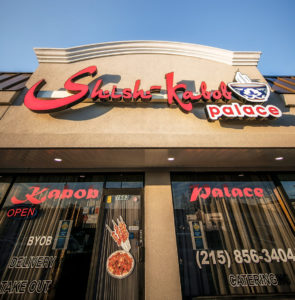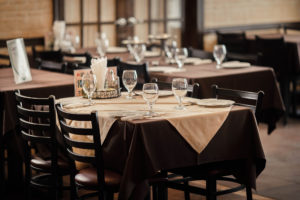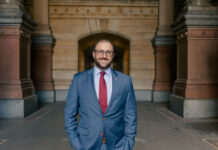Philadelphia instituted a COVID vaccine mandate effective Jan. 3 for “establishments that sell food or drink for consumption onsite,” said a news release on the city’s website.
And while several owners and managers of Jewish establishments said they believe in the vaccine’s efficacy, they are mixed on whether the mandate is needed.
As Steven Nawalany, the owner of Lipkin’s Bakery on Castor Avenue, put it, the mandate is “tough.”
According to the kosher bakery owner, the mandate is difficult not because it will require extra labor to check cards at the door. It won’t.
But rather, it will be difficult because so many of his patrons are unwilling to even wear masks. Lipkin’s has a mask sign on its door and kicks people out if they don’t wear one.
“They go to other businesses,” Nawalany said.
Despite the challenge it presents to business, the vaccine mandate is still a “good thing,” he added.
“If everybody were to get vaccinated, we could try to squash this virus,” he said.

Sam Uelkokhan, the general manager of the Jewish-owned Shish-Kabob Palace in Northeast Philadelphia, agrees with that statement but not the mandate.
Shish-Kabob Palace just became profitable again after a difficult stretch during the pandemic. In Uelkokhan’s year working there, it’s gotten busier each week, he said.
To stay profitable, the Middle Eastern eatery needs its regulars, Uelkokhan said. A vaccine mandate may turn some of them away.
“I was born and raised in Northeast Philadelphia. I know these people,” he said. “They believe what they believe.”
The manager thinks those customers will choose another establishment.
“If they have to avoid coming here, they will,” he said. “Especially when you can drive for 15 minutes and be in a county (Bucks) that does not have this mandate.”
Uelkokhan believes in the vaccine himself. As he put it, “I’m not an anti-vaxxer.”
He has also enforced the city’s mask mandate, which requires patrons to wear one inside until they sit down to eat. The manager enforces this even though, sometimes, it’s only for a 5-foot walk.
When people are unwilling to wear the cover while waiting for takeout, Uelkokhan even asks them to wait outside.
But the mask requirement does not restrict business since it doesn’t ask people to wear one during the meal. A vaccine mandate would prevent unvaccinated patrons from even getting to the table.
“A lot of people are going to look at us,” Uelkokhan said. “Like it’s us that are not allowing them to come in.”

“I don’t see what limiting my business is going to do,” he added.
According to the city, it will motivate more residents to get vaccinated, lower case counts and limit hospitalizations.
Due to the omicron variant, in the final week of 2021 Philadelphia saw record highs for case rates for the almost two-year pandemic. In Pennsylvania, COVID hospitalizations crossed 5,000 for the first time since last winter.
“Philly hospitals are very stressed,” said Jim Garrow, a spokesperson for the city’s Public Health Department.
Owners and managers of Jewish restaurants in Philly understand that concern. And even if they are worried about the mandate’s impact on business, they said they just want to know what they have to do to comply.
Garrow said the city is putting the word out through business associations and media outlets. But several restaurant owners have not heard about specific protocols for the mandate.
“We understand those avenues aren’t always the best for all restaurant owners in the city,” Garrow said.
Even the city’s initial mandate announcement on its website, though, did not specify the definition of fully vaccinated.
“Completing vaccinations means that they have completed the series of any vaccine that has been approved or authorized by either the Food and Drug Administration or the World Health Organization to prevent COVID-19,” read the announcement.
Garrow said that the city would follow the Centers for Disease Control and Prevention’s determination, too. At the moment, the CDC definition is two shots of the Pfizer or Moderna vaccine or one shot of the Johnson & Johnson product. So, for now, that is the city’s definition as well.
In other words, you don’t need the booster to be considered fully vaccinated — and to eat in a city restaurant. You just need to show your card or a picture of your card, marked with two shots, or one for J&J, at the door.
Garrow confirmed that the city would continue to follow the CDC’s definition moving forward.
“We’ve followed them throughout the pandemic and, as we learn more, guidance changes,” he said.
Only about a third of fully vaccinated American adults have gotten the booster, per the CDC.
City officials are not sure how long they will continue the mandate. Restaurant owners and managers are considering it alongside their other plans during the winter surge of cases.
“I believe we’ll continue to do indoor dining,” said Pieter Michalis, a shift leader at Merkaz, an Israeli establishment in Center City. “The only difference is we’ll be asking for the COVID vaccination card.”
[email protected]; 215-832-0740






